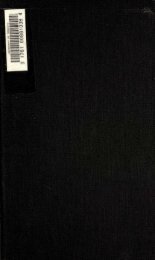Texts from the Buddhist canon : commonly known as Dhammapada
Texts from the Buddhist canon : commonly known as Dhammapada
Texts from the Buddhist canon : commonly known as Dhammapada
You also want an ePaper? Increase the reach of your titles
YUMPU automatically turns print PDFs into web optimized ePapers that Google loves.
76<br />
DHAMMAPADA.^<br />
' " As many kinds of flowers wlien waived to and<br />
fro scatter <strong>the</strong>ir scent far and wide,' so wide is <strong>the</strong> renown<br />
of his accumulated merits, who once is born<br />
and lives <strong>as</strong> he ought. The scent of <strong>the</strong> V<strong>as</strong>sikl flowers<br />
does not travel against <strong>the</strong> wind, but <strong>the</strong> (odour) of<br />
those who live religiously spreads far and wide<br />
<strong>the</strong> fame of <strong>the</strong> virtuous man pervades all places.<br />
The scent of sandal-wood and <strong>the</strong> Tagara," of<br />
<strong>the</strong> Lotus and V<strong>as</strong>sikl flower, although real and<br />
sensible, is not <strong>as</strong> <strong>the</strong> fragrance of (him who walks,<br />
according to) <strong>the</strong> precepts. Mean and false in com-<br />
parison is <strong>the</strong> scent of <strong>the</strong> rarest flowers with <strong>the</strong><br />
fame of him who holds by virtue, <strong>the</strong> excellency of<br />
whose conduct rises to heaven. He who thus lives<br />
in perfect, agreement with <strong>the</strong> precepts, who walks<br />
circumspectly, and who by fixed thought h<strong>as</strong> ob-<br />
tained rele<strong>as</strong>e, he h<strong>as</strong> far out-distanced <strong>the</strong> way of<br />
M^ra."<br />
And. on ano<strong>the</strong>r occ<strong>as</strong>ion, when Buddha w<strong>as</strong> residing<br />
on <strong>the</strong> Gridhrakuta Mountain, near E&jagriha, he recited<br />
<strong>the</strong> following g§,th<strong>as</strong><br />
:<br />
" As a ditch ' in <strong>the</strong> field, close beside <strong>the</strong> high-<br />
way, will produce <strong>the</strong> lily in its midst, and spread<br />
far and wide its delightful perfume, so in <strong>the</strong><br />
midst of life and death (that is, <strong>the</strong> phenomenal<br />
world), beside <strong>the</strong> way of false speculation (universal<br />
inquiry), <strong>the</strong> wise man difiuses his glad sentiments<br />
in becoming a disciple of Buddha."<br />
1 Agreeing witliT. S3 (<strong>the</strong> Sou<strong>the</strong>rn 'Notice should be taken of <strong>the</strong><br />
version). It is possible that <strong>the</strong> sym- symbols iised for VAssikt and Tagara.<br />
bol "to" in <strong>the</strong> text ought to be tran- » Pali, v. 58, 59, w.<br />
slated " Tagara."<br />
—





